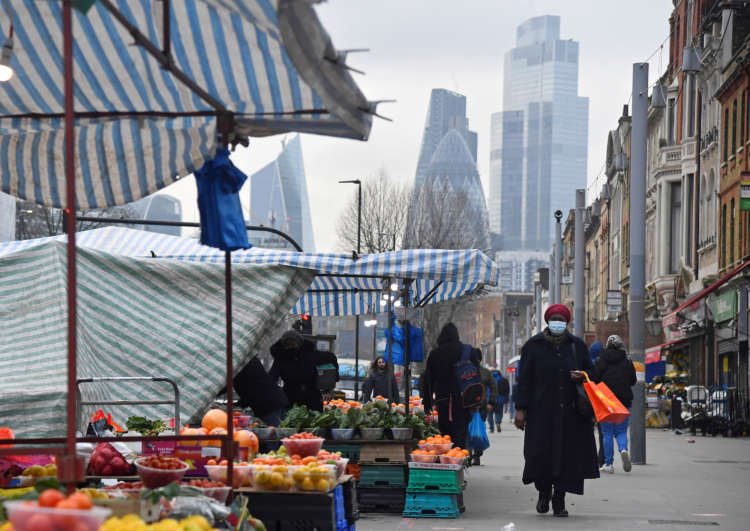Muted recovery for UK retailers in December ends worst year on record
Published by linker 5
Posted on January 25, 2021
4 min readLast updated: January 21, 2026

Published by linker 5
Posted on January 25, 2021
4 min readLast updated: January 21, 2026

By David Milliken and Andy Bruce
LONDON (Reuters) – British retailers struggled to recover in December from a partial coronavirus lockdown the previous month, marking a weak end to their worst year on record, while public debt has climbed to its highest since 1962, official data showed on Friday.
The figures suggest Britain’s economy had little momentum going into 2021. The government tightened COVID-19 lockdown rules on Jan. 5 to tackle a surge in cases that has kept Britain’s death toll the highest in Europe.
A closely watched business survey released on Monday showed the measures contributed to the sharpest fall in economic activity since May, in addition to headwinds from new paperwork for exports to the European Union.
Finance minister Rishi Sunak faces pressure from some in his Conservative Party to show spending is under control when he presents a new budget on March 3, after what is on track to be the heaviest annual borrowing since World War Two.
Sunak has again promised to put the public finances on “a more sustainable footing” once the economy begins to recover, after Friday’s data showed public borrowing since the start of the financial year in April reached a record 271 billion pounds ($370 billion).
Britain’s Office for National Statistics said retail sales volumes rose 0.3% in December, far less than economists’ forecasts in a Reuters poll for a 1.2% increase, leaving them just 2.9% higher than a year earlier.
For 2020 as a whole, retail sales were down 1.9%, the biggest calendar-year fall since these records began in 1996. Clothing sales slumped by more than a quarter and spending on fuel dropped by more than a fifth.
Sterling fell slightly against the dollar and the euro following the weaker-than-expected retail numbers.
“With no end in sight for retailers closed in lockdown, many will struggle to survive,” said Helen Dickinson, chief executive of the British Retail Consortium trade body, calling for more government help for the sector.
Department store Debenhams is among well known names to have collapsed. Administrators said last week its flagship Oxford Street store in central London would close permanently due to the latest COVID restrictions.
RECORD BORROWING
Public sector borrowing for the month of December came in at 34.1 billion pounds, just above Reuters poll forecasts. Total public sector debt had reached 2.132 trillion pounds, equivalent to 99.4% of GDP, the most since 1962.
Bank of England chief economist Andy Haldane said on Tuesday government borrowing on this scale was essential to stabilise the economy. He said he did not see a looming debt crisis, predicting interest rates would remain very low for a long time.
“This level of spending may be eye-wateringly large, but it is absolutely necessary,” said Charlie McCurdy, a researcher at the Resolution Foundation think tank.
December offered a partial respite for Britain’s economy, which has seen sharper falls in its official measure of output than any other advanced country, as well as Europe’s highest official death toll from COVID-19.
In November, the economy shrank 2.6%, due to a four-week lockdown in England and similar measures in other parts of Britain, although some restrictions had remained in place for retailers in December.
This month the government went further and shut schools as well as all non-essential retailers, which most economists think will lead to the economy contracting in the first quarter.
Flash purchasing managers index (PMI) data on Monday showed manufacturing growth slowed in early January, and services firms suffered a sharp fall in activity and reduced their workforce.
“The steepest loss of jobs was recorded in the hotels, restaurants, travel and leisure sectors, reflecting the new lockdown measures,” survey publishers IHS Markit said.
Experimental data from the ONS on Thursday showed consumer spending in early January was 35% lower than before the pandemic began in February, although the figures were not seasonally adjusted to reflect the typical post-Christmas lull.
Retail sales have performed better than other areas of consumer spending, with shoppers switching to online stores, where spending surged by 46.1% in 2020.
Excluding the slump in fuel sales, retail sales grew in 2020, albeit by the lowest level since 2011, reflecting extra spending on groceries and household goods by people stuck at home.
($1 = 0.7310 pounds)
(Reporting by David Milliken and Andy Bruce, Editing by Guy Faulconbridge, Edmund Blair and Emelia Sithole-Matarise)
Explore more articles in the Business category











